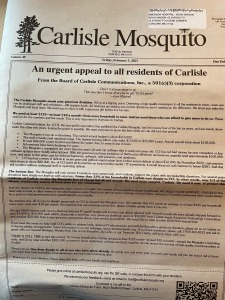
Local news board members Greg Bestick of the Harpswell Anchor, Fred Perry of Brookline.News and Virginia McIntyre of The Concord Bridge. Photo (cc) 2023 by Dan Kennedy.
Residents looking to start news organizations in their communities usually look to digital first. Even at the local level, advertising revenues are not what they used to be, and the cost of offering a print newspaper — both in terms of money and complexity — often isn’t worth it.
Yet the traditional notion of publishing a weekly newspaper remains attractive on several levels. Readers like it. Advertisers prefer it. And in many states, public notices placed by governmental agencies, a lucrative source of revenue, are restricted to print papers.
So I was interested to learn that print is part of the discussion at three nonprofit local news startups that were featured at a panel discussion, “The Re-Emergence of the Community Newspaper,” held during the recent conference of the NorthEast Association of Communications Executives, held in Meredith, New Hampshire.
The Harpswell Anchor in Maine and The Concord Bridge in Massachusetts have offered print right from the beginning. Brookline.News in Massachusetts is digital-only but may offer a print edition in the future. (Disclosure: Ellen Clegg, my research, podcast and writing partner, is also a founder and co-chair of Brookline.News.)
Greg Bestick, president of the nonprofit board that publishes the Anchor, said print was not something he and his fellow founders especially wanted to offer. What changed their mind, he explained, was that a survey of the community revealed that 95% wanted something they could hold in their hands.
“We weren’t thrilled about that,” Bestick said, “but we did say we’d be much more robust online than the previous owner.”
Unlike The Concord Bridge and Brookline.News, which were both launched in response to massive budget cuts by the newspaper chain Gannett, The Harpswell Anchor had been a locally owned for-profit newspaper until several years ago. The paper ceased publication during the COVID-19 pandemic, Bestick said. The new iteration of the Anchor has had an operating surplus from the start, he added, and won 11 awards from the Maine Press Association during its first year.
Virginia McIntyre, a member of The Concord Bridge’s board, said the founders of that site were enthusiastic about print right from the start. “We wanted something people could have on the kitchen table,” she said, adding: “It’s nice to have something that the family can see as a whole. Our advertisers also like having an ad that hits every household.” The print edition of the Bridge, she explained, is mailed for free to each of Concord’s 8,700 households.
Discussions about starting a community news outlet began after Gannett decided in early 2022 to eliminate nearly all local journalism from its Massachusetts weeklies. The Concord Journal is still published, but it’s filled with regional stories from throughout Gannett’s network. Because of that, McIntyre said, many residents had no idea about important developments such as the hiring of a town manager and a $110 million middle school project. Although the Bridge includes feature stories and coverage of school sports, she said that the goal is to inform the public about day-to-day goings-on.
“It’s not entertainment,” she said. “I always thought Concord was a boring place, and now I know it is.”
In contrast to Concord, Gannett shut down the Brookline Tab altogether, leaving a community of nearly 60,000 people just minutes from Boston without any local source of news. “The Tab was not good. But it was something,” said Fred Perry, a member of the Brookline.News board.
Brookline.News’ website didn’t go live until last week; a newsletter began covering the town just before the annual town meeting in April. Perry said he’s hoping that the project can start offering a print edition sometime this fall, praising “the wonderful examples on both sides of me,” a reference to Bestick and McIntyre. Several other board members, he added, are skeptical of print because of the cost, but he said he’s optimistic that print “can generate a significant surplus.”
The panel discussion was moderated by John Harrison, an executive with Wallit, a company that helps publishers manage digital subscriptions.
In many cases, digital-only makes sense. LION (Local Independent Online News) Publishers, an organization for digital news entrepreneurs, has more than 300 members. Many of the projects that Ellen and I are profiling in our forthcoming book, “What Works in Community News,” are digital-only, and they have no plans to add a print edition.
Yet print has persisted long past its anticipated expiration date. Perhaps the best way to think about it is that print is still worth doing — but only if it makes sense in terms of revenue, reader preferences and advertiser reach.
Correction: Updated with the proper spelling of Greg Bestick’s name.




